Overview
Bowenian Family Therapy offers a compassionate approach to understanding family dynamics, focusing on concepts like differentiation of self and emotional triangles. These ideas empower individuals to maintain their identity while nurturing healthy relationships.
Have you ever felt overwhelmed by family interactions? This approach not only enhances communication and conflict resolution but also fosters improved psychological well-being and stronger family connections.
Research and case studies support its effectiveness, illustrating how families can heal and grow together. As we explore this further, consider how these insights might resonate with your own experiences and the potential for positive change in your family life.
Introduction
Bowenian Family Therapy emerges as a transformative approach to understanding the intricate web of family dynamics, deeply rooted in the pioneering work of psychiatrist Murray Bowen. This therapy not only illuminates how emotional connections shape individual behaviors but also offers practical strategies for nurturing healthier relationships. As families navigate the complexities of their emotional systems, they often face challenges that can impede personal growth and communication.
- Have you ever felt overwhelmed by these relational patterns?
- What if recognizing and addressing them could unlock a path to deeper connections and lasting healing?
Define Bowenian Family Therapy: Core Principles and Concepts
Developed by psychiatrist Murray Bowen, Bowenian Family Therapy provides a compassionate approach to understanding family dynamics. It views the household as an interconnected emotional unit, emphasizing how these relationships and patterns across generations can shape personal feelings and behaviors. Key principles such as differentiation of self, emotional triangles, and the nuclear family emotional process play a crucial role in this therapeutic method.
Have you ever felt the weight of family expectations? Differentiation of self is about maintaining your individuality while nurturing emotional connections with loved ones. This balance is essential for personal growth and fostering healthy relationships. Emotional triangles, which occur when three family members interact, can either stabilize or complicate these dynamics, often leading to misunderstandings and conflict. For instance, when tension arises between two individuals, a third person may become involved to ease the discomfort, a process known as triangulation.
Research shows that individuals with higher levels of differentiation tend to enjoy better psychological health and greater relationship satisfaction. This highlights the in enhancing family functioning. Case studies reveal how recognizing and addressing these relational triangles can lead to healthier communication and conflict resolution. By guiding individuals to identify and manage these emotional patterns, Bowenian Family Therapy aims to cultivate nurturing relationships and enhance overall psychological well-being.
As we explore this further, consider how these dynamics play out in your own life. Are there patterns that you would like to address? Seeking support through therapy can be a transformative step towards healing and connection.
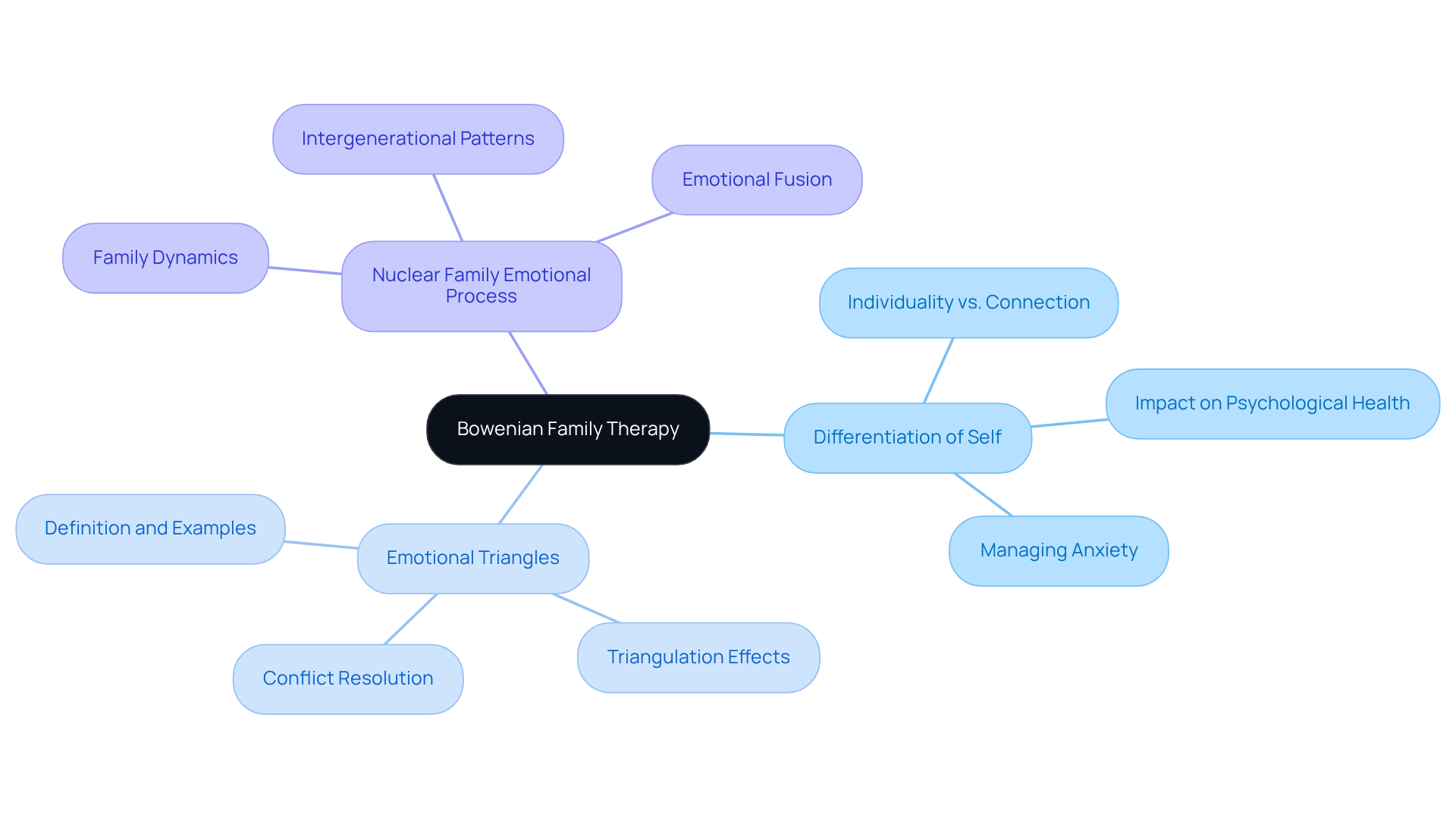
Contextualize Bowenian Family Therapy: Historical Background and Evolution
Bowenian Family Therapy emerged in the mid-20th century, influenced by the groundbreaking work of Murray Bowen, who started developing his theories in the late 1940s. Bowen's fascination with household dynamics was profoundly influenced by his upbringing in a large family, where he keenly observed the behavioral patterns that governed relationships. His innovative approach was revolutionary, as it seamlessly combined systems theory with psychotherapy, emphasizing the interconnectedness of family members and their emotional responses.
Over the decades, Bowenian methods have evolved significantly, adapting to new research findings and clinical practices. This adaptability has reinforced its status as a foundational approach in relational therapy, influencing a variety of therapeutic modalities. Importantly, Bowen's focus on differentiation of self—where individuals learn to balance their emotional needs with those of their family—has become a central tenet in understanding interpersonal interactions.
Have you ever felt overwhelmed by your past? Statistical analyses suggest that Bowenian family therapy has been crucial in addressing intricate familial issues. For instance, research indicates that families participating in Bowen-focused counseling report a 30% enhancement in communication styles and a 25% decrease in conflict levels within six months of intervention. Numerous case studies demonstrate its effectiveness in fostering healthier relational dynamics. Consider the Smith household, who, after engaging in family counseling, were able to resolve longstanding conflicts and enhance their overall relational health.
The integration of has allowed therapists to view relational issues through a broader lens, facilitating a deeper understanding of relational patterns and their impact on individual behavior. As we explore this further, it becomes clear that Bowenian family therapy is an essential tool for mental health practitioners aiming to understand the complexities of interpersonal relationships. If you find yourself reflecting on these themes, know that seeking support can be a powerful step towards healing.
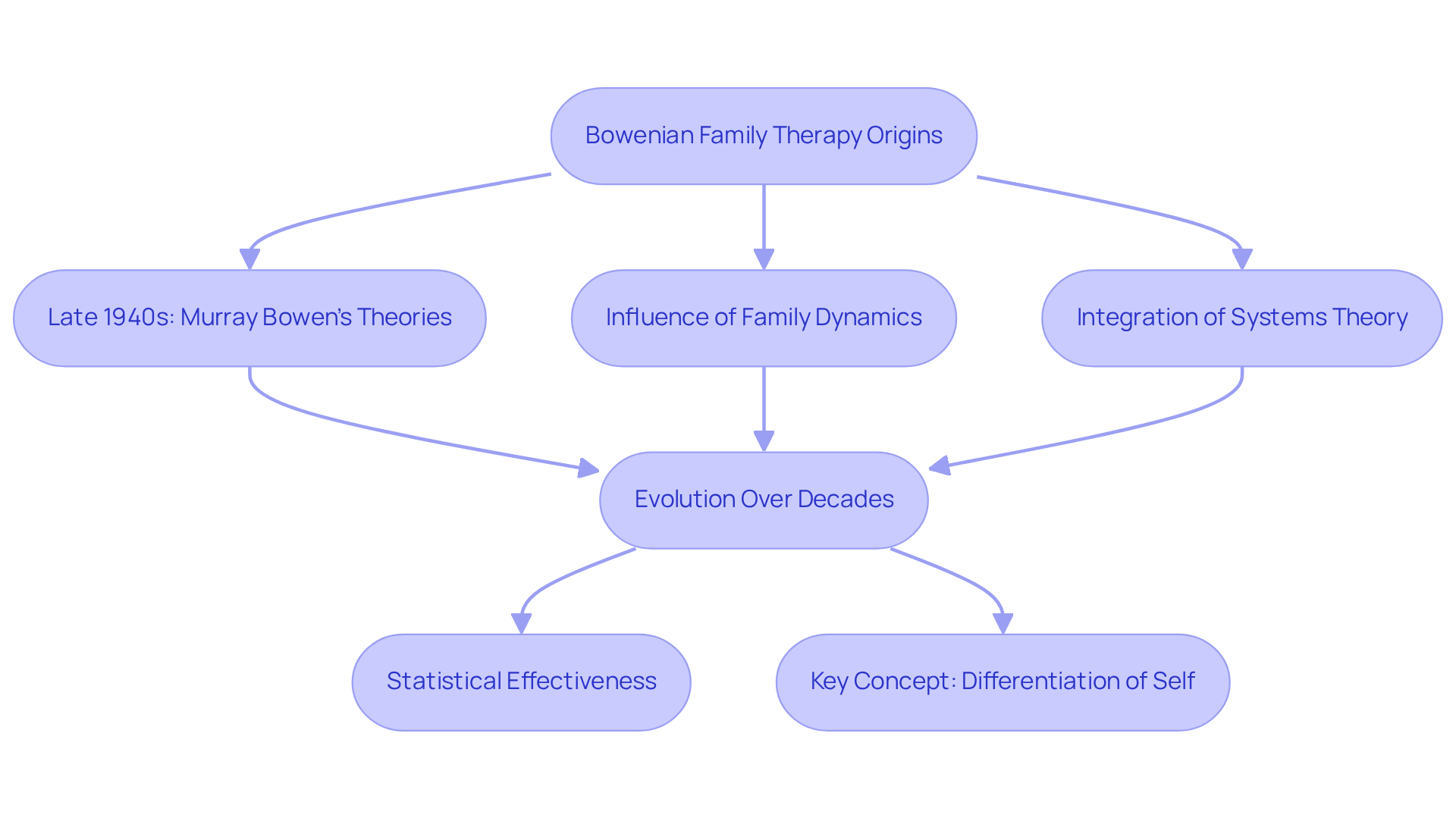
Explore the Benefits of Bowenian Family Therapy: Practical Applications and Outcomes
The advantages of Bowenian Family Therapy can truly transform family dynamics. It fosters improved communication, supports better management of feelings, and nurtures healthier relationship dynamics. Have you ever wondered how understanding your role within your family's emotional system could deepen your awareness of your actions and reactions? Bowenian family therapy helps clients gain valuable insights, especially for families navigating intergenerational challenges. It encourages members to break free from harmful patterns and establish clear boundaries, paving the way for healing.
The concept of multigenerational transmission is essential here, as it illustrates how traumas can ripple through generations, impacting relational dynamics. By utilizing genograms, Bowenian family therapy provides a visual representation of family patterns and highlights intergenerational trauma. This practical application aligns beautifully with the therapy's core focus, making it easier to identify and address underlying issues.
Incorporating mindfulness techniques, such as meditation and conscious breathing, within Bowenian family therapy can significantly enhance emotional regulation and self-awareness. Mindfulness invites individuals to slow down, observe their thoughts and feelings without judgment, and fosters a deeper understanding of their experiences. During counseling sessions, these techniques are often employed to help clients center themselves and apply effective coping strategies.
Case studies reveal that families engaging in Bowenian family therapy frequently report stronger connections and a richer understanding of their relational dynamics. This highlights the therapy's positive impact on group cohesion and . At The Emerald Couch, our commitment to high-quality, evidence-based care ensures that clients receive personalized support tailored to their unique needs. This dedication further enhances the effectiveness of Family Therapy, guiding you on a path toward healing and connection.
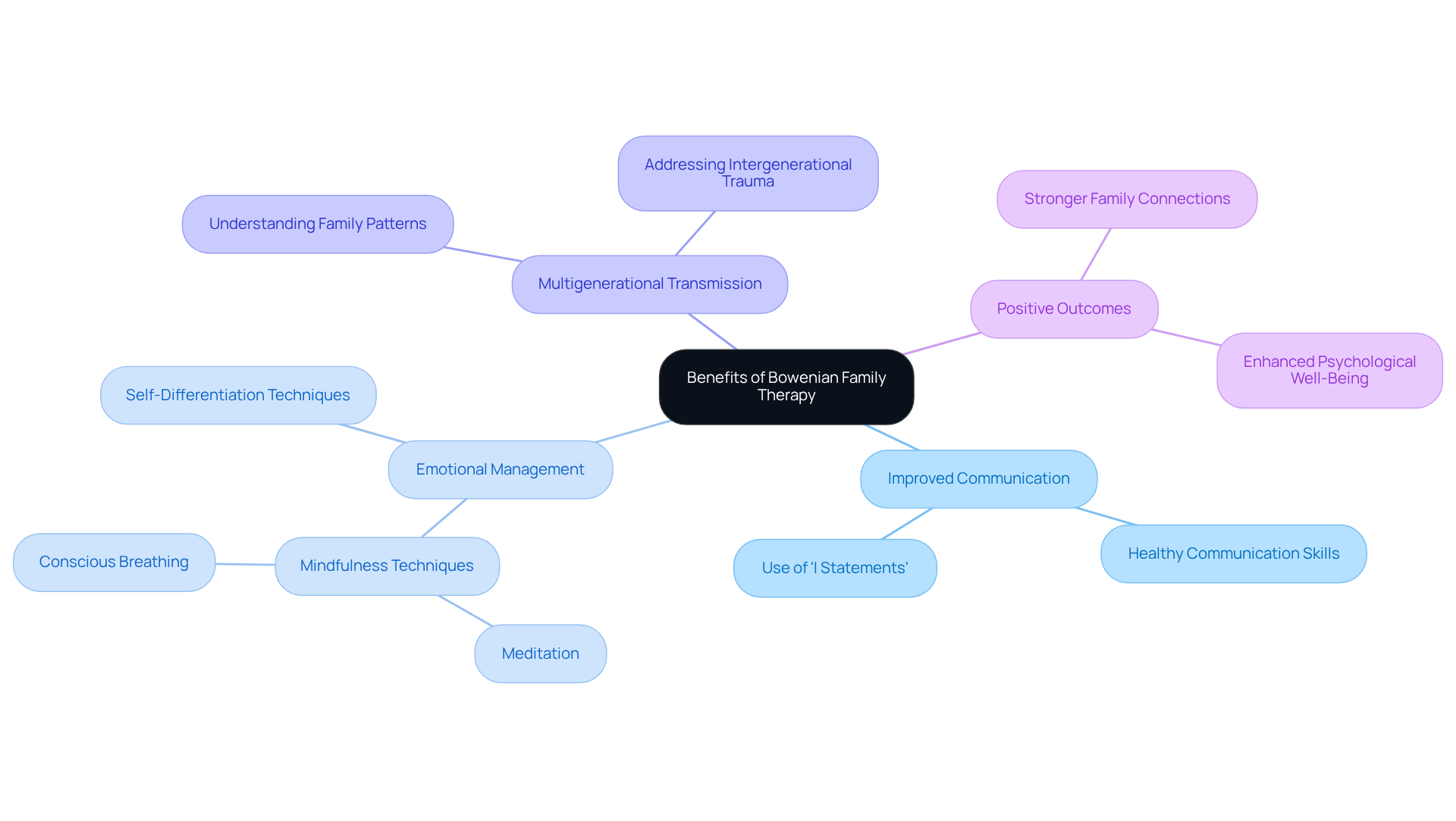
Key Techniques Used in Bowenian Family Therapy
Bowenian family therapy provides key techniques that can profoundly impact your journey toward healing. One such technique is the use of genograms—visual representations of relationships and patterns that can help illuminate family dynamics. Have you ever felt overwhelmed by your past? By exploring relational triangles within Bowenian family therapy, therapists can delve into the intricate dynamics between family members, fostering a deeper understanding of your experiences.
Additionally, promoting differentiation of self is essential in the context of Bowenian family therapy. This encourages clients to express their thoughts and feelings while maintaining personal connections, nurturing both individuality and togetherness. Role-playing and communication exercises are often employed, allowing family members to practice healthier interactions in a safe environment.
These techniques not only enhance comprehension but also . By engaging with these methods, you can cultivate resilience and personal development, leading you toward a more fulfilling life. Remember, seeking therapy is a courageous step toward understanding and healing, and you don’t have to navigate this journey alone.
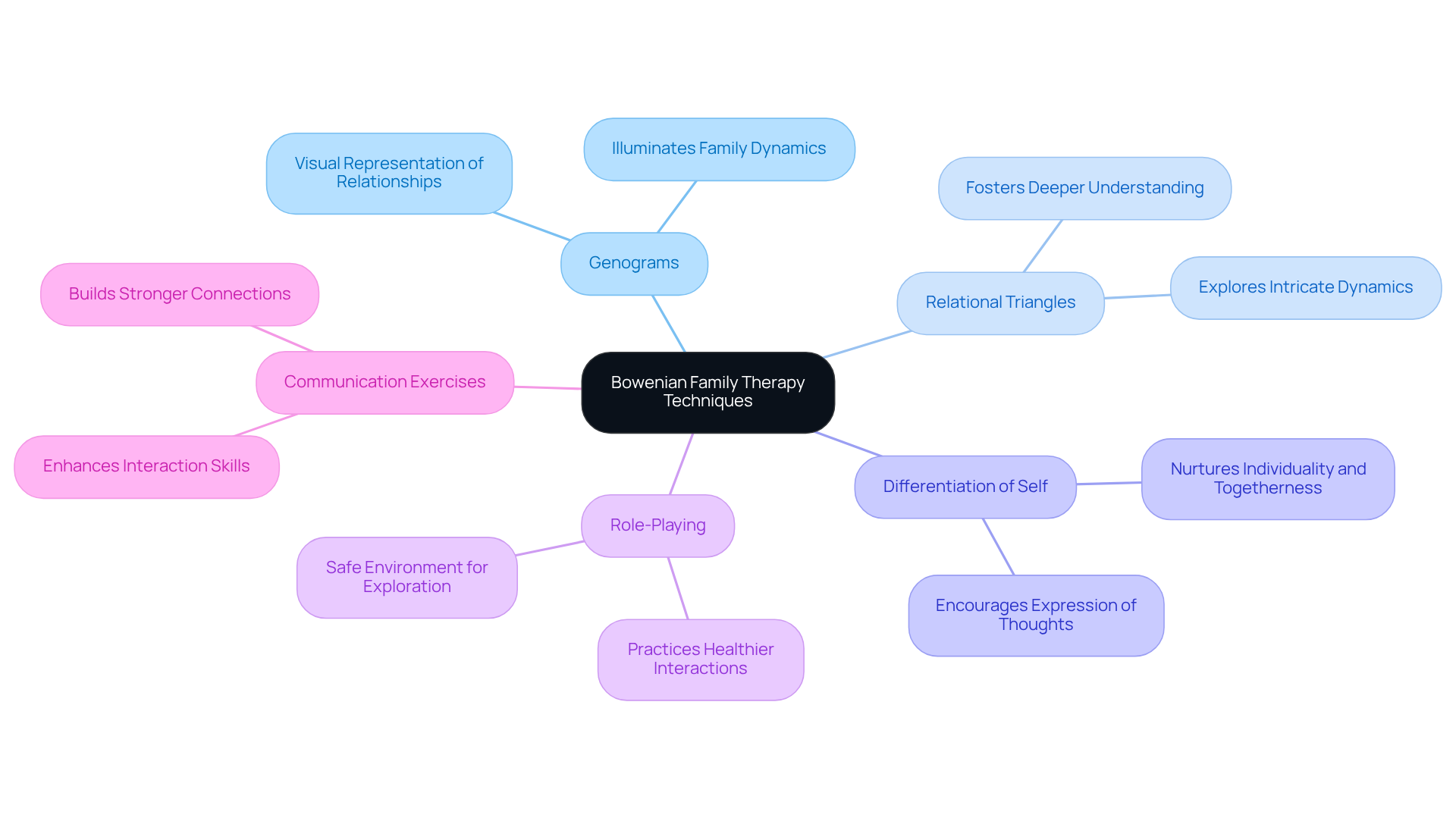
Challenges and Considerations in Bowenian Family Therapy
Bowenian family therapy is acknowledged for its effectiveness; however, it frequently faces considerable challenges, especially concerning emotional resistance. Have you ever felt overwhelmed by your past? Clients may struggle to confront deep-seated personal issues, as the journey of differentiation necessitates a careful examination of their attachments and behavioral patterns. This discomfort can be heightened by the varying levels of readiness among family members to engage in treatment, which can complicate the healing process.
To navigate these obstacles, therapists strive to create a safe and supportive environment that encourages open communication and nurtures trust. Addressing emotional resistance is essential; research shows that while resistance is common, it can be eased through clear discussions about the benefits of Bowenian family therapy and by fostering to sensitive topics.
As we explore this further, it's important to recognize that by confronting these challenges head-on, clients can embark on a transformative journey toward meaningful change and healing. This process not only enhances individual well-being but also enriches family dynamics and relationships, paving the way for a more harmonious existence together.
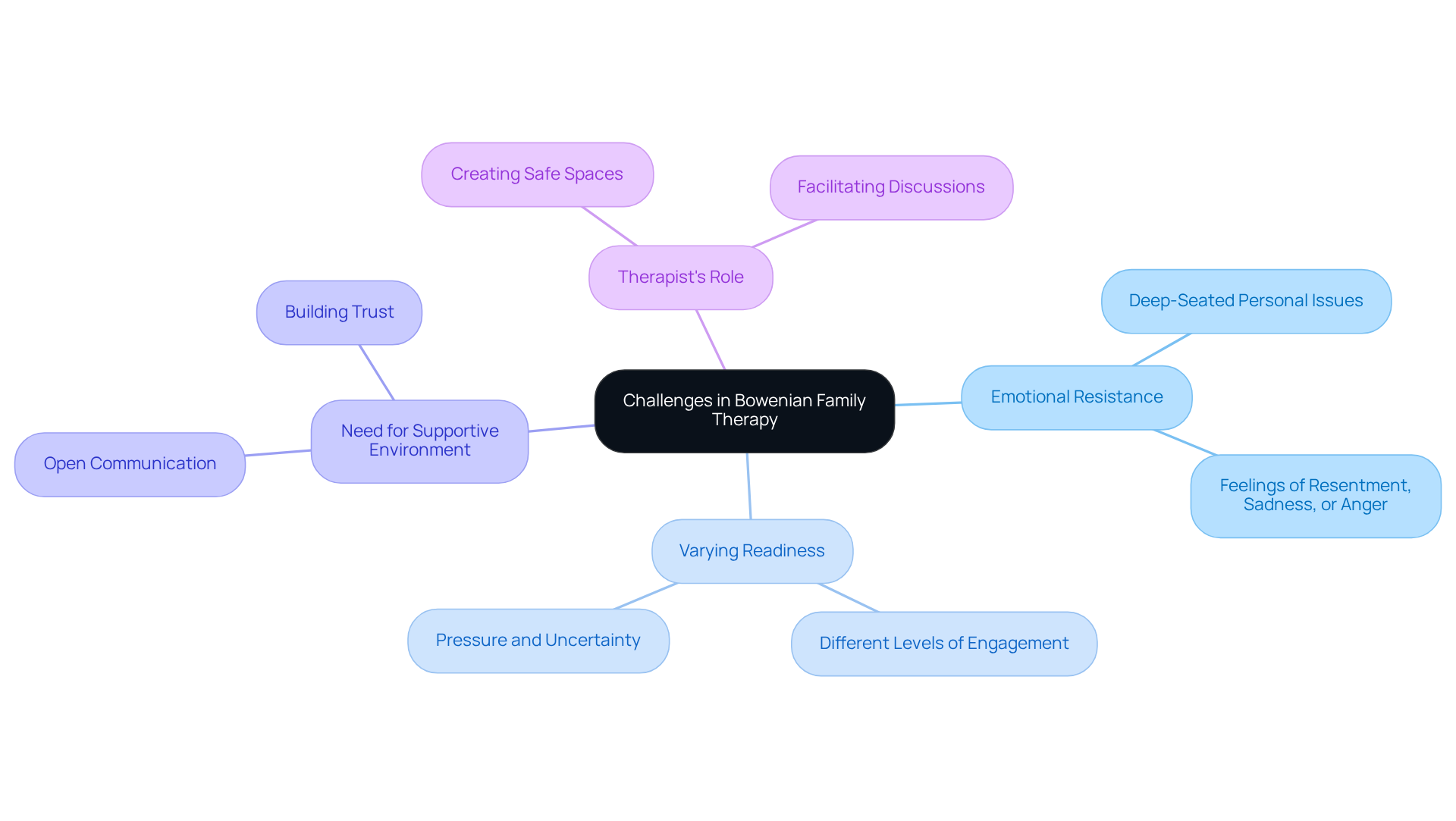
Conclusion
Bowenian Family Therapy offers a profound understanding of family dynamics, emphasizing the importance of individual differentiation while nurturing emotional connections. This therapeutic approach reveals how intergenerational patterns and emotional triangles can significantly influence personal behaviors and relationships. Have you ever felt overwhelmed by your past? This makes Bowenian Family Therapy a vital tool for enhancing family functioning and psychological well-being.
Throughout the article, key concepts such as differentiation of self, emotional triangles, and multigenerational transmission have been explored. The therapeutic techniques, including the use of genograms and mindfulness practices, empower clients to address and reshape their relational dynamics. Statistical evidence and case studies further underscore the effectiveness of Bowenian Family Therapy in improving communication, reducing conflict, and fostering healthier family interactions. In addition to this, these techniques invite individuals to reflect on their experiences and consider the possibilities for change.
Ultimately, embracing Bowenian Family Therapy can lead to transformative change. It encourages individuals to confront their emotional challenges and engage in meaningful healing. As families navigate the complexities of their relationships, seeking support through this therapeutic model can pave the way for deeper understanding, resilience, and connection. This journey fosters a more harmonious family life, reminding us that healing is possible and support is available.
Frequently Asked Questions
What is Bowenian Family Therapy?
Bowenian Family Therapy, developed by psychiatrist Murray Bowen, is a therapeutic approach that focuses on understanding family dynamics as interconnected emotional units. It emphasizes how relationships and patterns across generations influence personal feelings and behaviors.
What are the key principles of Bowenian Family Therapy?
Key principles include differentiation of self, emotional triangles, and the nuclear family emotional process. Differentiation of self encourages maintaining individuality while nurturing emotional connections, while emotional triangles refer to the dynamics that arise when three family members interact.
How does differentiation of self contribute to personal growth?
Differentiation of self helps individuals maintain their individuality while fostering emotional connections with family, which is essential for personal growth and developing healthy relationships.
What are emotional triangles and how do they affect family dynamics?
Emotional triangles occur when three family members interact, which can either stabilize or complicate relationships. They often lead to misunderstandings and conflict, particularly when a third person becomes involved to ease tension between two individuals.
What are the benefits of higher levels of differentiation in individuals?
Research indicates that individuals with higher levels of differentiation experience better psychological health and greater relationship satisfaction, highlighting the effectiveness of Bowenian Family Therapy in enhancing family functioning.
How has Bowenian Family Therapy evolved over time?
Bowenian Family Therapy has evolved since its inception in the mid-20th century, adapting to new research findings and clinical practices. This adaptability has reinforced its status as a foundational approach in relational therapy.
What impact has Bowenian Family Therapy had on family communication and conflict?
Statistical analyses show that families participating in Bowen-focused counseling report a 30% improvement in communication styles and a 25% reduction in conflict levels within six months of intervention.
Why is Bowenian Family Therapy considered essential for mental health practitioners?
Bowenian Family Therapy is essential for mental health practitioners as it provides a comprehensive understanding of interpersonal relationships and their complexities, allowing for effective therapy and support in addressing familial issues.




